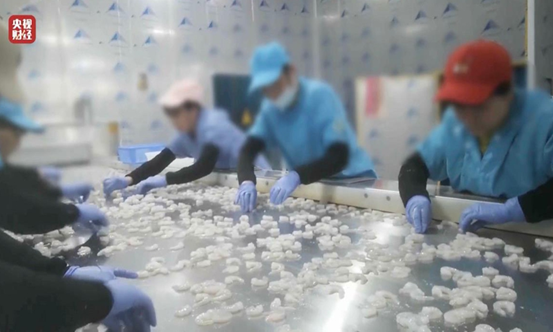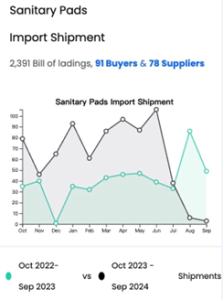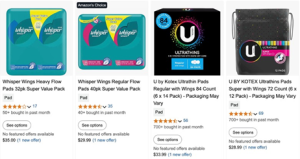
Sanitary pads, a kind of feminine monthly essential products, have become a global female focus due to price and quality.
State broadcaster CCTV of China reviewed the consumer rights scandals at the 315 Gala. The program stated cases of online selling sanitary pads being made from discarded materials, exposing vicious usage in the consumer supply chain.
According to Australian Volza imported data, from October 2023 up to September 2024, Australia imported 767 sanitary pads. 34 foreign exporters gave them 33 Australian buyers, which is a 58% increase compared to a year ago.

Sanitary Pads Import Business in Australia (Photo: Volza)
Could these items, which should have been terminated, come across country borders or E-commerce platforms and go inside Australia?
Inferior sanitary pads likely flowing into the global market
Based on the Global Times, one of the first scandals to be exposed on the 315 Gala was happening around the Liangshan Xixi Paper Products of East China’s Shandong Province. It is said that the company collects and reuses waste and counterfeit sanitary products, and sells them again to the market at a price 260 to 8000 Chinese yuan per ton.
These products manufactured by the firm mainly target to Chinese market, with no evidence showing that they were exported to Australia. However, part of the products from the company are OEM production, which indicates that failure to oversee it could lead to export to overseas markets. There are issues of refurbishment and label-cutting within the sanitary industry.
At the same time, these products might flow into the international market through E-commerce platforms, AliExpress and Temu. Therefore, strengthening supervision on the supply chain and the products’ traceability is the key to protecting consumer rights.
In fact, the Australian government has a strict standard of controlling imports, where sanitary pads are classified as low-risk medical instruments. Female sanitary products must follow Therapeutic Goods (Standards for Tampons) (TGO 103) Order 2019. ACCC (Australia Competition & Consumer Commission) returned numerous Chinese unqualified daily products, but there was no record of sanitary pads being returned in recent years.
If the producers bypass the supervision intentionally and export via complex supply chain, these defective products may enter the Australian market.
Consumers better to identify sanitary products
Forbidding unqualified sanitary products from entering Australia lies beyond merely the government’s responsibility. It is imperative that consumers remain cautious whenever shopping. They are suggested to identify from where the product originated. Generally, official and qualified sanitary products would have manufactural information and details written on their packages.
These products should also contain approved markings by the government and registration numbers. Consumers ought to choose local pharmacies or E-commerce platforms with high reputations. They may pay attention to merchants’ comments on cross-border E-commerce platforms and the shipping location.
E-commerce platforms supposed to take supervising duties
Cross-border E-commerce platforms, as intermediates, link global sellers to buyers. Their overseeing capability and responsibility have long been a center of argument. As these platforms grow rapidly, one would wonder whether they should be responsible to products provided by a third party.
Obliviously, platforms, as promulgators of product information and promoters of deals, are supposed to take reviewing responsibilities. If platforms’ failure to examine the merchant’s qualifications allows inferior products to enter the market, consumers interests will be compromised enormously.
Given there are plenty of products with complex origins, platforms should implement Product Quasi-Mechanisms, including random inspection. Also, they can cooperate with the local government to complete the product origin-tracing system and ensure transparency in circulation.
E-commerce platforms should turn from deal-makers to supervisors of products. Not only does this raise platforms’ credibility, but lowers any risks faced by consumers and pushes their sustainable development.
Gender topic behind sanitary pads
The safety discussion concerning sanitary pads grows above supervision and product origin. It unveils an issue long been overlooked that females are in the marginal position of consuming system along with gender inequality.
In December 2024, ABC News reported that Chinese sanitary pads manufacturing used to declare the size of its products longer than the actual size. This seemed to be mismeasurement, and yet it caused numerous women protests and measurement actions. In Chinese internet, there were discussions of women being neglected. This indicates that women’s needs are to be dealt with fairly and with respects.
In addition, neither is Australia free from systematic predicaments of female sanitation. In October 2023, ABC News pointed out that because of the rapid rise of sanitary pads, females were forced to turn to cheap substitute or delay the time of using them. This heavily threatened their health both mentally and physically, rendering their lives qualities downgraded. Therefore, the government ought to provide free sanitary products to lessen women’s pressure brought by the rise of living costs.

Screenshot of sanitary pads prices on e-commerce platforms
What is more troubling is that “period poverty” still remains largely despite female sanitary products going devise and period stigma weakened. In December 2024, ABC News stressed that a considerable number of women with financial issues were unable to obtain reliable and sufficient amounts of sanitary pads, affecting their studies, work and social lives. Poverty, neglection and price have all wrought invisible walls, leaving unprotected the rights of feminine physical health which should have been respected.
Females’ insistence on health, safety and dignity
To understand better in the real-life women’s feeling toward the safety of sanitary pad and consumption fairness. An international student in Syndey shared her experience in interview.
Interview of Jialing Li, a student at the University of sydney
Her answer combined quality, price and gender quality together. It not only represented her personal situation, but stated the pressure faced by modern women across counties. This sort of mental disharmony reaches beyond concerns toward the health and price, but incorporates anxiety due to information asymmetry.
As she claimed, when whole society tacitly approves of women’s tolerance, no matter to the high price and the shrinking size of the sanitary products, gender inequality could extend even further. The interview made it clear that behind what seems to be normal consumption is females’ stickiness to health, safety and dignity.
Only when every sanitary pad is safe in the process of supply, circulation and consumption will women’s right be protected.
Reference
ABC News. (2023, October 21). Coles and Woolworths respond to rising cost of period products. https://www.abc.net.au/news/2023-10-21/coles-woolworths-cost-of-period-sanitary-products/102993324
ABC News. (2024, December 20). Period products change, but poverty still an issue. https://www.abc.net.au/news/2024-12-20/period-products-change-but-poverty-still-an-issue/104714010
ABC News. (2024, December 5). Sanitary pad scandal sparks outrage in China. https://www.abc.net.au/news/2024-12-05/sanitary-pad-scandal-sparks-outrage-in-china/104674990
Global Times. (2025, March). China investigates sanitary pad scandal involving recycled materials. https://www.globaltimes.cn/page/202503/1330173.shtml
South China Morning Post. (2024, March 15). China’s annual 315 gala uncovers illegal supply chain of sanitary pads made from waste . https://www.scmp.com/news/china/article/3302887/chinas-annual-315-gala-uncovers-illegal-supply-chain-sanitary-pads-made-waste
Therapeutic Goods Administration. (n.d.-a). Tampons and menstrual cups. Australian Government Department of Health and Aged Care. https://www.tga.gov.au/how-we-regulate/supply-therapeutic-good/supply-other-therapeutic-goods/tampons-and-menstrual-cups
Therapeutic Goods Administration. (n.d.-b). Therapeutic Goods Orders. Australian Government Department of Health and Aged Care. https://www.tga.gov.au/about-tga/legislation/legislation-and-legislative-instruments/therapeutic-goods-orders
Volza. (n.d.). Sanitary pads import in Australia. https://www.volza.com/p/sanitary-pads/import/import-in-australia/

Be the first to comment